题解之前
愉悦的要火十人ACM大赛即将开始!
飞扬的小鸟
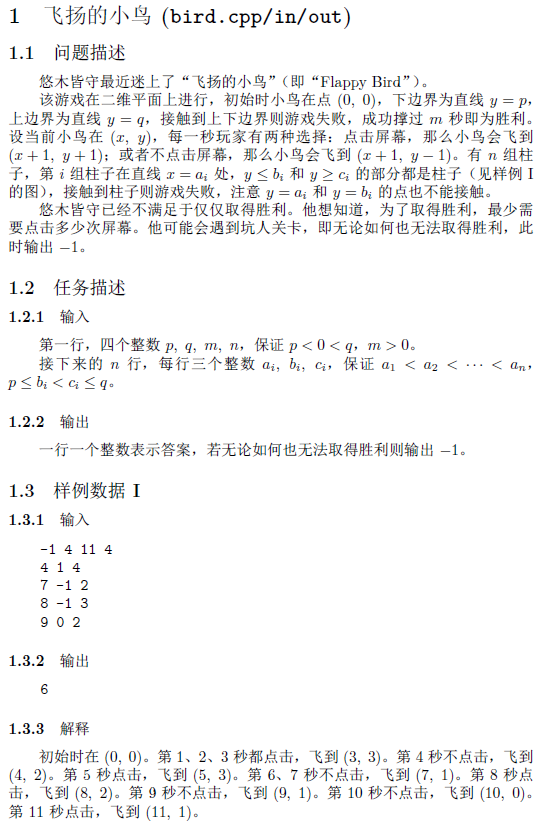
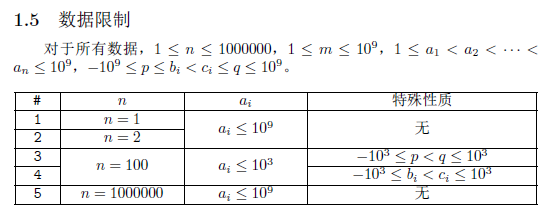
以为是NOIP2014
发现实则不然
容易发现,从(0,0) 走到(x,y) 的点击次数是(x+y)/2,要点击次数最少,则到达终点时y 最小,所以只需维护小鸟能到达哪些点。
可以发现,如果能到达(x0,y1) 和(x0,y2)(不妨设y1 < y2),那么一定能到达(x0,y1),(x0,y1+2)......(x0,y2-2),(x0,y2),因为每多点一次y 就增大2,那么对于每个x,小鸟能到达的位置都是一个区间内y 的奇偶性相同的所有位置,所以可以递推维护在每个障碍处y 的取值范围[li,ri],如果发现某时y 没有合法取值则输出无解。但需特判当q-p = 2 时(此时p = 1,q = 1)一定无解,其余情况可以不用考虑边界。时间复杂度O(n)
#define FN "bird"
#include <cstdio>
#include <cctype>
typedef bool bnt;
typedef void vnt;
struct buf
{
operator int()
{
register int c = getchar(), x = 0; register bnt s = false;
for (;!isdigit(c); c = getchar()) s |= c == '-';
for (; isdigit(c); c = getchar()) x = x * 10 - '0' + c;
return s ? -x : x;
}
} fio;
int p, q, m, n, x, a, b, c, l, r;
inline vnt nxt()
{
l -= a - x, r += a - x;
if (l <= b) l += (((b - l) >> 1) + 1) << 1;
if (r >= c) r -= (((r - c) >> 1) + 1) << 1;
}
int main()
{
freopen(FN ".in", "r", stdin);
freopen(FN ".out", "w", stdout);
p = fio, q = fio, m = fio, n = fio;
if (q - p == 2)
puts("-1");
else
{
for (x = 0; n-- && x < m; x = a)
{
a = fio, b = fio, c = fio;
if (a > m) a = m, b = p, c = q;
nxt();
if (l > r) return puts("-1"), 0;
if (!n && a < m) x = a, a = m, b = p, c = q, nxt();
}
printf("%d\n", (x + l) >> 1);
}
return 0;
}
复杂的道路
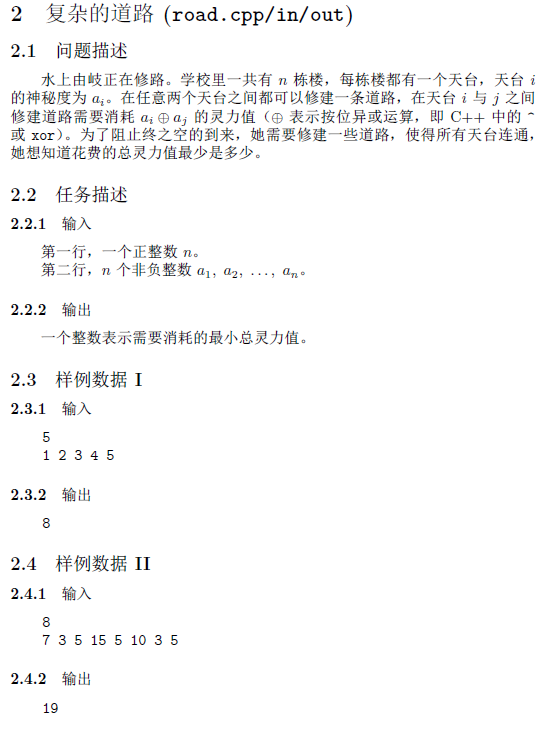
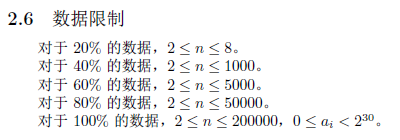
看见异或,首先想到trie树,看见连接成一棵树,就想到最小生成树。
所以trie树+kruskal就可以了。
很棒!
#include<bits/stdc++.h>
#define FN "road"
const int oo=1e9+7;
const int maxn=2e5+5;
long long ans,cost;
struct Trie {
int ch[maxn<<5][2];
int siz[maxn<<5];
int val[maxn<<5];
int sz,up=30;
void init() {
sz=1;
memset(ch[0],0,sizeof(ch[0]));
}
void insert(int x) {
int u=0;
for(int i=up;i>=0;i--) {
int c=((x>>i)&1);
if(!ch[u][c]) {
memset(ch[sz],0,sizeof(ch[sz]));
val[sz]=0;
ch[u][c]=sz++;
}
u=ch[u][c];
}
val[u]=x;
}
int getSize(int x) {
if(!ch[x][0]&&!ch[x][1]) return siz[x]=1;
if(ch[x][0]) siz[x]+=getSize(ch[x][0]);
if(ch[x][1]) siz[x]+=getSize(ch[x][1]);
return siz[x];
}
void dfs(int x) {
if(ch[x][0]) dfs(ch[x][0]);
if(ch[x][1]) dfs(ch[x][1]);
if(ch[x][0]&&ch[x][1]) {
cost=oo;
int lson=ch[x][0];
int rson=ch[x][1];
if(siz[lson]<siz[rson])
calc(lson,x);
else
calc(rson,x);
ans+=cost;
}
}
void calc(int x,int pre) {
if(ch[x][0]) calc(ch[x][0],pre);
if(ch[x][1]) calc(ch[x][1],pre);
if(!ch[x][0]&&!ch[x][1]) {
int now=query(val[x],pre);
if(cost>(val[now]^val[x]))
cost=(val[now]^val[x]);
}
}
int query(int x,int pre) {
int u=0;
for(int i=up;i>=0;i--) {
int c=((x>>i)&1);
if(!ch[u][c]) c=1-c;
if(u==pre) c=1-c;
u=ch[u][c];
}
return u;
}
}trie;
int main() {
freopen(FN".in","r",stdin);
freopen(FN".out","w",stdout);
int n;
scanf("%d",&n);
trie.init();
for(int i=1;i<=n;i++) {
int x;
scanf("%d",&x);
trie.insert(x);
}
trie.getSize(0);
trie.dfs(0);
printf("%lld\n",ans);
return 0;
}
紧凑的代码
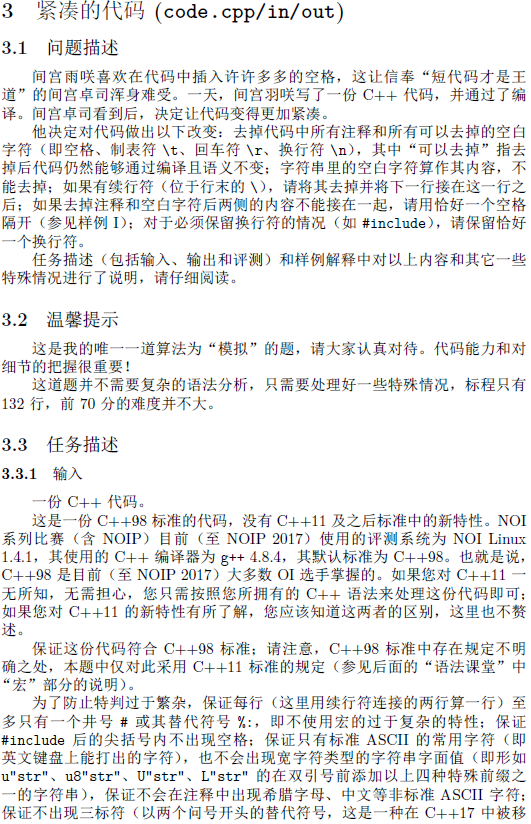
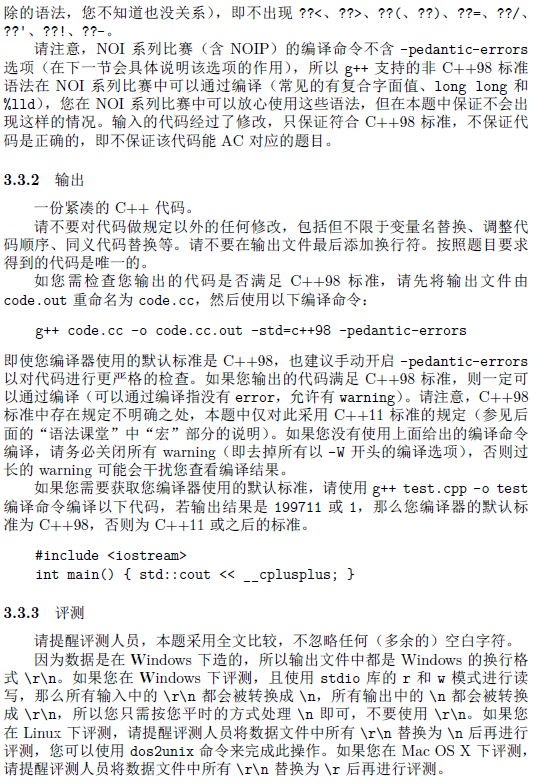
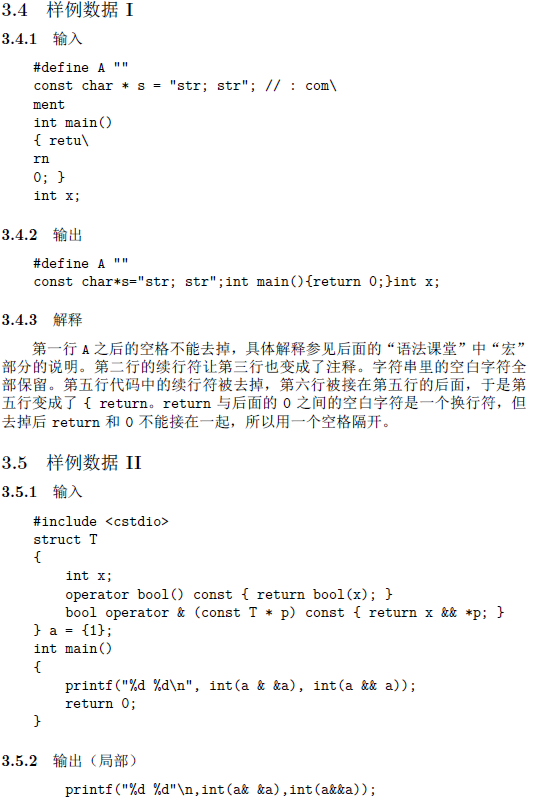
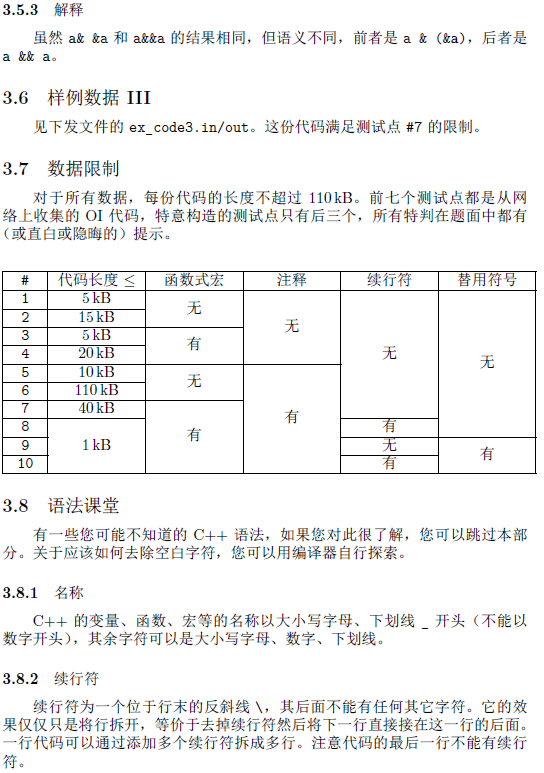
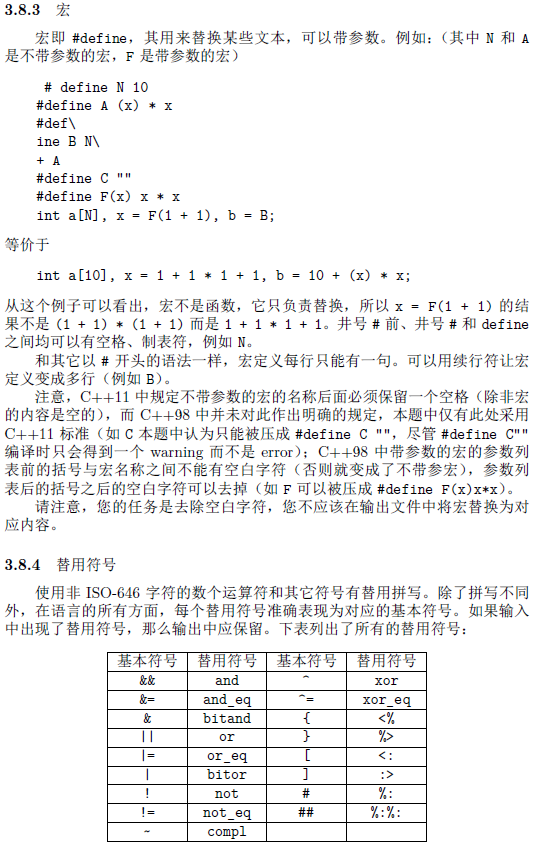
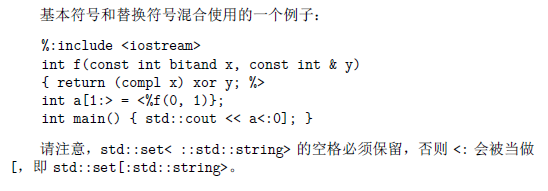
手动说再见~
我是真的服了。
不会做。
作为每年都有省队的CDQZ,最高分10分。
出题人称略高于NOIP2017时间复杂度。
我失去梦想了。
#define FIO "code"
#include <cstdio>
#include <cctype>
#define L_MAX 112640
#define O_MAX 55
#define N_MAX 56
#define C_MAX 127
inline bool is_name(int c)
{
return isalnum(c) || c == '_' || c == '$';
}
char a[L_MAX + 1],
* i = a, * j = i, * k = a, * l = k; // [i, j): last word; [k, l): current word
const char * op[O_MAX] = {
"((", "))", "[[", "[<:", "]]", "]:>", "{{", "{<%", "}}", "}%>",
"##", "#%:", "..", "!!", "~~", ",,", ";;",
"++", "=+=", "+++", "--", "=-=", "---", "**", "=*=",
"&&", "=&=", "&&&", "||", "=|=", "|||", "^^", "=^=",
"<<", "=<=", "<<<", "=<<=", ">>", "=>=", ">>>", "=>>=",
"==", "===", "=!=", "??", "::", ":::",
"''", "\"\"", "//", "=/=", "c//", "C/*", "%%", "=%=",
};
int n = 1, trie[N_MAX + 1][C_MAX], type[N_MAX + 1],
r, // is forced to break line?
s, t; // type of [i, j), [k, l); [0] => empty, [1] => name, [c] => type
inline void insert(int t, const char * s)
{
static int u;
for (u = 1; *s; u = trie[u][int(*s++)])
if (!trie[u][int(*s)]) trie[u][int(*s)] = ++n;
type[u] = t;
}
inline bool check()
{
return s == ' ' ||
(s == 1 && t == 1) ||
(s == '/' && (*k == '/' || *k == '*')) ||
(s == ':' && *k == ':') ||
(s == '+' && *k == '+') ||
(s == '-' && *k == '-') ||
(s == '<' && *k == '<') ||
(s == '>' && *k == '>') ||
(s == '&' && *k == '&') ||
(s == '<' && *k == ':') ||
(s == '%' && *k == ':') ||
//
(s == 1 && t == '"' && j != k && \
((j - i == 1 && (*i == 'u' || *i == 'U' || *i == 'L')) || \
(j - i == 2 && *i == 'u' && *(i + 1) == '8')));
}
inline void output(int c = 0)
{
if (c) putchar(c);
i = k, j = l, s = t;
while (k < l) putchar(*k++);
}
inline char seek(char * l)
{
while (*l == '\\' && !*(l + 1)) gets(l);
return *l;
}
inline void seek_char(char *& l)
{
for (seek(l); *l != '\'' || *(l - 1) == '\\'; seek(++l));
++l;
}
inline void seek_str(char *& l)
{
for (seek(l); *l != '"' || *(l - 1) == '\\'; seek(++l));
++l;
}
inline void seek_comment_line(char *& l)
{
for (seek(l); *l; seek(++l));
}
inline void seek_comment_block(char *& l)
{
do
{
++l;
while (!seek(l))
*l++ = '\n', gets(l);
seek(l);
}
while (*l != '/' || *(l - 1) != '*');
++l;
}
inline int seek_word(char *& k, char *& l)
{
static int t, u;
do
{
k = l;
while (isspace(seek(k)))
++k;
if (!*(l = k))
t = 0;
else if (is_name(*l)) // names | numbers
for (t = 1, ++l; is_name(seek(l)); ++l);
else
{
for (u = 1; seek(l) && trie[u][int(*l)]; u = trie[u][int(*l++)]);
t = type[u];
switch (t)
{
case '\'': seek_char(l); break;
case '"': seek_str(l); break;
case 'c': seek_comment_line(l); break;
case 'C': seek_comment_block(l); break;
}
}
}
while (t == 'c' || t == 'C');
return t;
}
int main()
{
freopen(FIO ".in", "r", stdin);
freopen(FIO ".out", "w", stdout);
for (int o = 0; o < O_MAX; ++o)
insert(*op[o], op[o] + 1);
r = '^';
while (gets(l))
{
if (r == '\n') putchar('\n'), r = s = 0, i = j;
t = seek_word(k, l);
if (k == l)
continue;
else if (t != '#')
output(check() ? ' ' : 0);
else
{
output(s == 0 ? 0 : '\n');
r = '\n', t = seek_word(k, l), output();
if (*i == 'd') // is #define?
{
t = seek_word(k, l), output(' ');
if (seek(l) != '(') s = ' ';// is function-like macro?
}
}
while ((t = seek_word(k, l)))
output(check() ? ' ' : 0);
}
return 0;
}
正在紧锣密鼓的进行研究。
好像大家放弃了对于要火算法的研究。
来源:https://www.cnblogs.com/LoLiK/p/9651114.html